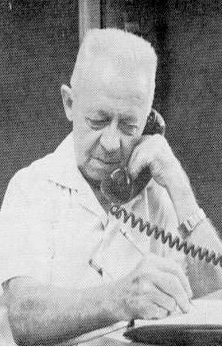
Dr. W.L. “Tommy” Thompson (1896-1974)
Inducted 1977
Highlights
Entomology
State Plant Board
Lake Alfred Citrus Experiment Station
Aphids
Mechanical Hedging Machines
Florida Entomological Society
Bio
Dr. W.L. “Tommy” Thompson was born at State College, Pennsylvania, in 1896. After graduation from Pennsylvania State, and service in World War I, Thompson pursued more advanced education. Eventually migrating to Florida, Thompson became a citrus entomologist, with the state plant board at Lake Alfred from 1925 until 1927. In 1927, he began his affiliation with the citrus experiment station at Lake Alfred, which continued until he retired in 1962. Throughout his long career Thompson published more than 200 articles covering the biological and chemical control of aphids, mites, and other insects and mites which adversely affect citrus.
His work with controlling the aphids was his most significant contribution to the citrus industry. Aphids are among the most destructive insect pests on earth. They can completely destroy flowers, vegetables and even trees often times before the grower even recognizes that there is a problem. One “colonizer” can produce up to 80 offspring in as little as a week. Thompson helped develop the insecticidal soaps that prevent aphids from establishing colonies in the citrus trees.
Thompson’s work at the research center also included finding ways to improve the overall health of citrus trees. His research also discovered that citrus trees need several minor elements, including copper, zinc, manganese and iron. Lake Alfred scientists in conjunction with the USDA, developed fertilizer recommendations for citrus and provided growers with some of the most comprehensive nutritional information available for any crop at that time. Thompson also was the first to conduct studies on mechanical hedging machines, which eventually became the standard for all Florida groves.
During his career he also served as an officer in the Florida Entomological Society, and the Florida State Horticultural Society. He received the annual research award presented by the Florida fruit and vegetable association. In 1973 he was presented with the Florida Department of Agriculture’s Plant Protection “Award of Eminence.” This award is given for significant contributions to the Department’s plant protection programs and Florida agriculture. Thompson eventually was awarded an honorary degree of doctorate of science from the University of Florida.
